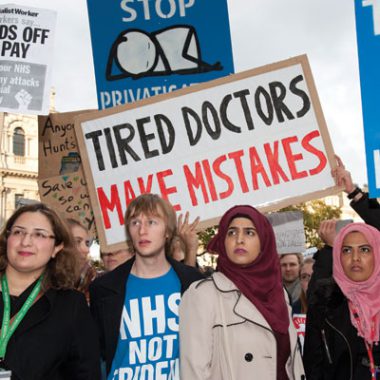The BMA has suspended strike action over the junior doctors contract tomorrow after reaching an agreement with NHS Employers and the Department of Health to enter ’direct and meaningful’ negotiations.
The detail of the agreement says that ’following productive talks under the auspices of Acas’ the BMA has agreed to ’temporarily suspend its proposed strike action’ planned to begin tomorrow.
In return, the Department of Health has agreed to ’temporarily suspend implementation of a contract without agreement’.
Despite the successful conciliation talks, health secretary Jeremy Hunt said it was a ‘tragedy’ that the BMA did not talk earlier, and said that doctors now ’realise that what we are trying to do is the best thing for patients and for doctors’.
Under the plans for strike action, junior doctors were due to only provide emergency care on 1 December, followed by a full walk-out from 8am to 5pm on Tuesday 8 December, and another at the same time on Wednesday 16 December.
The ballot of junior doctors earlier this month showed an almost unanimous support for strike action, with 99.4% of junior doctors voting in favour of industrial action short of a strike, while 98% voted in favour of strike action on a turnout of 76%.
At the same time, the BMA also announced that it had approached Acas with a view to holding conciliatory talks with the Department of Health over the health secretary’s plans to impose a contract that will remove safeguards for unsafe working, and will see rewards for weekend work taken away.
The Government had originally refused the talks, but it U-turned on the issue last week, and talks had continued over the weekend.
The statement – published by Acas on behalf of the BMA, the Department of Health and NHS Employers – says: ’We intend to reach a collaborative agreement, working in partnership to produce a new contract for junior doctors, recognising their central role in patient care and the future of the NHS.
’All parties are committed to reaching an agreement that improves safety for patients and doctors and therefore NHS Employers have agreed to extend the timeframe for the BMA to commence any industrial action by four weeks to 13 January 2016 at 17:00, to allow negotiations to progress.
’Within that timetable, the BMA agrees to temporarily suspend its proposed strike action and the Department of Health agrees similarly to temporarily suspend implementation of a contract without agreement.’
BMA chair Dr Mark Porter said: ‘Following conciliatory talks with NHS Employers and the Department of Health, we have agreed to suspend industrial action in England, which was due to begin at 8am tomorrow. The Government has also agreed not to proceed unilaterally with the introduction of a new contract. Today’s decision is in the best interests of patients, doctors and the NHS.’
But he added: ‘At that point, we will need to consider whether industrial action should be reinstated.’
Mr Hunt tweeted: ’Victory for common sense. Strike shouldn’t have been called w/o talking to govt first but great for 7 day services.’
He later told Sky News: ’The tragedy is that it took so long for the BMA to want to actually sit around the table and discuss it. But when they did, as doctors, I think they did realise that what we were trying to do was the best thing for patients and for doctors. I hope now we can make progress.’
Under the Government’s proposals, GP trainees would see the removal of a guaranteed supplement that ensures they receive pay parity with their secondary care collegues.
Please note: This story was updated on 1 December at 9:35 to incorporate Jeremy Hunt’s comments, and after official confirmation that strike action had been suspended.
READ THE FULL ACAS STATEMENT HERE
Pulse October survey
Take our July 2025 survey to potentially win £1.000 worth of tokens












